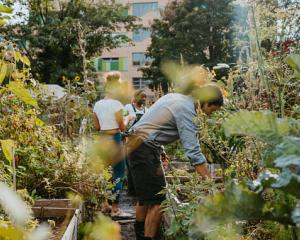It is autumn. Harvest time. A season and event with which many of us have little connection. But Bruce Munro discovers an initiative to harvest often-neglected urban fruit trees as a means to reconnect people with local food, traditional skills, nature and each other.
This pear is a gift.
Russeted brown on green, polished, firm and promising sweetness; it has budded and burgeoned on a mature tree in the back corner of Marjory Finnie's South Dunedin property.
It is a Conference pear - long-necked and juicy, one of the most widely grown varieties in New Zealand. All summer long it has been ripening in a north-facing gap in foliage near the middle of the tree.
''My husband always had the compost heap in the corner with it,'' Mrs Finnie (77) says by way of explanation for the tree's fruit-burdened branches.
''I don't spray. We never have. I suppose it's what they would call organic these days.''
Mrs Finnie's typical suburban-sized back yard is overflowing with good things. The perimeter is given to this pear tree and a nearby Packham pear, as well as a heritage apple tree and black and red currant bushes. In the middle are mounded rows producing potatoes, runner beans, carrots, beetroot, onions, broccoli, yams, cabbage, mint, rhubarb and strawberries.
A trellis edging two sides of the vegetable garden bears an espalier apple tree and blackberries, while a small glasshouse along the far side has grapes, tomatoes, lettuce and one enormous silverbeet plant.
Mrs Finnie has lived here for 50 years. It is where she and Jack, who died 18 months ago, lived most of their married life and raised their two children.
She was a stay-at-home mum - the sort who supplemented the shop-bought groceries with plenty of homegrown vegetables and homemade jams and preserves. Dinner-time dessert more often than not included bottled or stewed fruit from their own garden.
''He did the vege garden and I did the rest,'' she said.
''Sometimes it would see us right through to the next planting. Sometimes not.
''The garden's not so good now. Age has caught up with me.''
Mr Finnie had grown up in Palmerston where his father had kept a large garden. It was a keen interest, passed on to his son and maintained by Mr Finnie when he moved to Dunedin and married. A gift of fresh, healthy, full-flavoured food to ensuing generations.
And now it is being passed on again.
Mrs Finnie is donating most of the fruit from her two pear trees to the Dunedin Community Fruit Harvesting and Preserving Group.
''I don't like them to go to waste,'' she says.
''If it's teaching other people skills like how to preserve fruit, that's good.
''If people were to plant fruit trees and put in gardens they would have all these things coming on. They're not hard to grow.''
This is the third year the group has organised an autumn harvest of urban fruit trees.
Kick-started in 2011 by Sustainable Dunedin City's (SDC) then youth action facilitator Janet Young, the project is now run by Presbyterian Support Otago (PSO) in partnership with SDC and Northeast Valley resilience group Transition Valley 473.
The project matches willing harvesters with donors who do not want or cannot use all the fruit from their trees, co-ordinator Kristen Bracey (50) says.
After the harvest, other teams come together at school and community kitchens to process the fruit: bottling it, making jams and chutneys or baking crumbles and pies. Experience is not required or even desirable, Ms Bracey, of Northeast Valley, says.
''The goals are minimising waste, using local foods and sharing skills.''
The resulting food is divided between donors, harvesters, kitchenhands and the PSO food bank.
Last year's harvest was turned into 75 peach preserves, 21 plum preserves, 100 mostly apple and pear crumbles, 200 pies, about 100 jars of chutney and 200 of jams and jellies.
This year dozens of people will be involved. Fruit is being collected and used from about 30 trees. The harvest of Mrs Finnie's pears alone weighed 130kg.
The project is seeing plenty of small successes.
A young mum who donated fruit for this year's plum harvest, held early in February, mentioned to Ms Bracey she would like to know how to grow vegetables.
''I was able to tell her about the Shetland St community garden, which is not far from where she lives.''
Ms Bracey also mentions an elderly man who heard about the project last year.
''He is not very mobile, but the kids [involved in the project] loved climbing the trees to pick the fruit, and he was delighted to once again taste fresh fruit from his trees.
''He received some of the preserved fruit and is donating the crop again this year.''
It is one small way to help people get to know their neighbours, she says.
''When you think about the recent sad case of the man who died alone and unknown here in Dunedin ... I don't know all the answers, but things which bring people together to share skills and abilities have to help.''
Dave Hodson (35) stands on an aluminium ladder and stretches up his arm to harvest the pear.
''I'd forgotten you don't use your fingers,'' Mr Hodson, who has picked fruit on commercial orchards in New Zealand and Australia, says.
''You sort of use the palm and roll your hand.
''If you pull, the pear is more likely to break off at the neck.''
Mr Hodson heard about the harvest project through his partner Annika Korsten (27) who had met Ms Bracey at a sustainability workshop.
He is a keen proponent of local eating, who has turned the back lawn of his Tomahawk home into a vegetable garden and planted some fruit trees.
''A lot of food could be generated in Dunedin if we made good use of the available space,'' he says.
And eating what is available seasonally helps people be ''grounded'', he believes.
''It stops you moaning about the rain so much.''
Pat Hanan (73) draws a peeler down the body of the pear. During the two weeks since it was picked, the skin has yellowed and the flesh softened. Sugary juices run over fingers and blade.
In the small Pine Hill School kitchen, now strewn with preserving and baking ingredients, large pots are stirred on the stove and the oven is heated in readiness for fruit crumbles. Through in the adjoining hall on this Sunday afternoon other volunteers peel and chop banana boxes full of donated fruit. They are joined by a few curious locals who are at the school for a community fun day.
Standing at the kitchen servery, Mrs Hanan cores and dices fruit which will be added to a pear, date and walnut chutney.
When she emigrated from the United Kingdom in 1963 the only desserts that seemed to be available in New Zealand restaurants were fruit salad from a tin, ice-cream with toppings or apple pie, she recalls.
''So I made it my job to make fantastic puddings and desserts,'' Mrs Hanan says.
It is a skill she taught her children and which they in turn are passing on.
''I do think we should be teaching people to do this for themselves, rather than doing it for them.
''These skills have all but disappeared.''
Associate Prof Winsome Parnell applauds the project's goals but also offers a caution.
''Anything that promotes the use of what otherwise would become waste produce is a good idea,'' Prof Parnell, of the University of Otago's human nutrition department, says.
People often ignore produce, such as apples that are better cooked than eaten fresh, because they do not have the knowledge and skills to use it, she says.
So the project, which aims to retain and teach those skills, is valuable.
It would not be positive, however, to suggest everyone should be growing, harvesting and preserving fruit and vegetables, Dr Parnell says.
To expect a working mother who comes home and cooks a meal each evening and does the household cleaning in the weekend to also plant and use fruit and vegetables ''would not be a good shift''.
Many people, including those with limited financial resources, are time-poor, she says.
''But if they have the time to do it, it's a great thing to do.''
Whether it is planting some vegetables or buying in season from local growers, Dr Parnell encourages people to find ways to reduce the distance between themselves and the sources of their food.
''If you are food-aware and enjoy your food you'll try a wider variety, which will help meet your nutritional requirements.
''There's also a social aspect to food. If you enjoy it you might be more likely to invite people around for a meal. So it can have benefits for relationships.''
Nirmala Ritchie (45) stands in her living room holding a jar of chutney that contains some of the pear.
Six people live in the homely, three-bedroom North Dunedin bungalow - Mrs Ritchie and her husband David, neither of whom have work, and their four children aged 11, 9, 7 and 4.
They occasionally receive a food parcel from the PSO food bank. But because one of the children has significant food allergies Mrs Ritchie has found it is sometimes more practical to ask Work & Income for a food grant to buy the food best suited to the family's needs.
''You sometimes get hard-up ... sometimes because bills are due,'' Mrs Ritchie says.
''Everyone does. But I'm not shy to talk about it.''
When she was growing up in Fiji, her father kept a large vegetable garden and there was lots of fruit growing wild. The children helped with all aspects of gardening.
Here in Dunedin she puts those skills to use, growing what resources and the climate allows.
This year there have been garlic, mint, tomatoes, lettuce, parsley and broad beans.
Mrs Ritchie has also taught Fijian Indian cooking to a coffee group at the local school.
Today's fresh apples, fruit crumble and pear chutney from the food bank are gratefully received.
Mrs Ritchie samples the chutney.
''It's good,'' she says.
''I think I will add a little chilli ... and we'll have it with roast meat and lettuce in pita bread parcels.''
The pear is a gift. A gift from an ardent gardener born more than a century ago to a proud but sometimes struggling family today; a gift of knowledge, time and skills by the few, to the many, to the whole; a gift of taste, nourishment, community and perspective to anyone who cares to take a bite.
Get involved
To donate fruit or volunteer to harvest fruit, phone Kristen Bracey on (03) 473-9535. To take part in the next fruit-processing workshops, turn up at Bathgate Park School, Macandrew Rd, South Dunedin, or Dunedin North Intermediate School, North Rd, Northeast Valley, between 10am and 3pm, on Saturday, April 6.












